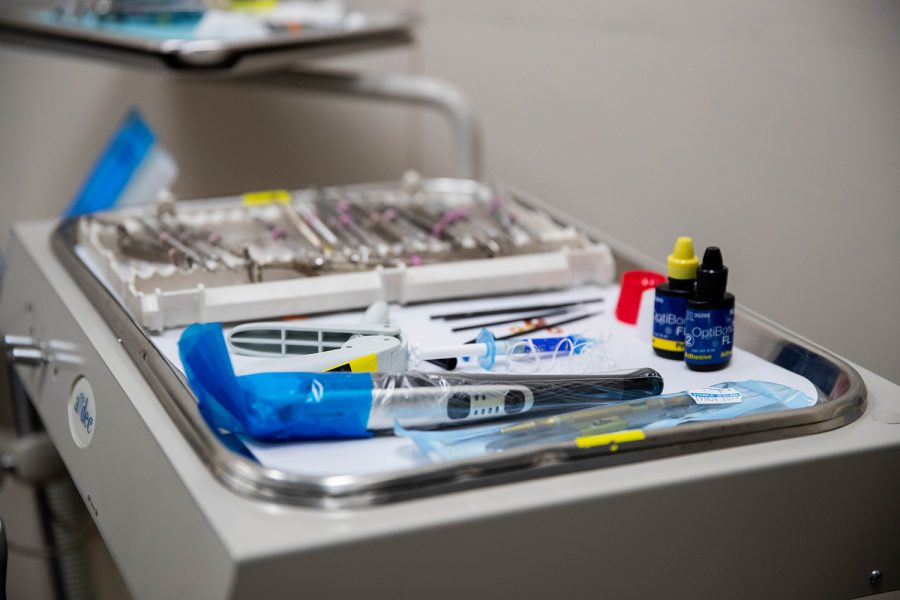As eligibility for dental benefits increases in the state, the University of Iowa College of Dentistry is seeing an influx of Medicaid patients from private dentist offices.
Iowa has seen a 1.63 percent increase in Medicaid patients in the last year with 13,351 new members. The total number as of May 2023 was 833,203.
UI College of Dentistry Dean Clark Stanford views the increase as a positive and said for Medicaid patients in particular, the university is the principal source for specialty care in the state.
Specialty care includes oral-maxillofacial surgery, which is a facial correction surgery performed to heal jaw, face, and/or mouth defects, root canal procedures, oral facial pains, and pediatric dentistry.
Stanford said there are pediatric dentists who take Medicaid patients, which is integral as children account for a large number of the Medicaid population.
“No one entity can absolve the access to health care issue,” Stanford said.
Stanford said the primary issue with this access is that private practitioners who see adults have been continuing to see the Medicaid patients they have been seeing historically but are not seeing new Medicaid patients.
“This has created more and more problems for patients who want to utilize their dental benefits provided by the state Medicaid program,” Stanford said.
As a result, many patients end up having to come to Iowa City for specialty care services.
Stanford said the UI College of Dentistry specifically relies on patients to help with the educational mission of its students.
By the end of their first year at the College of Dentistry, dental students are doing surgical procedures and treating patients, under faculty supervision, all through the rest of their schooling.
Stanford attributed private dentist practices being unable to see new Medicaid patients to the expansion of Medicaid and COVID-19.
Stanford said there were a number of programs federally that allowed benefits to continue so patients qualified for services.
“If you are over in Council Bluffs and the only dentist who can see you is in Iowa City, you are talking about a five-hour drive over here,” Stanford said.
Another issue is that there are not a lot of specialists who can provide specialty care in Iowa.
Alex Carfrae, Public Information Officer at the State Department of Health and Human Services, said these dental benefits are through two providers, MCNA Dental of Iowa and Delta Dental Wellness Plan.
Both MCNA and Delta Dental Wellness offer Medicaid to children and adults, and offer a variety of services, ranging from crowns and fillings to extractions and denture replacements.
The Medicaid plans offer an annual benefit maximum of $1,000 for adults, Carfrae said. The annual benefit maximum covers most dental procedures including routine cleanings and other dental services, although it doesn’t go towards $1,000 max.
The Eastern Iowa Health Center, located in Cedar Rapids, accepts both forms of Medicaid, though Delta Dental Wellness Plan is more widely accepted in the state of Iowa, according to Dental Clinic Manager Jill O’Hara.
O’Hara said there has been a large influx of Medicaid patients needing care in the Eastern Iowa Health Center’s clinic in the last few years since very few providers now accept Delta Dental Wellness Plan and MCNA.
“Unfortunately, with the overhead cost of the private practices and low reimbursement rates from Medicaid, unless this changes, private offices have no large incentive to enroll with Medicaid,” O’Hara said.
O’Hara said 80 percent of the clinic’s patients have Medicaid and the situation has become worse in recent years with fewer offices than ever that take any of these patients.
She also said the Eastern Iowa Health Center clinic has had to turn away hundreds of patients in the last three to four years. With its current space and number of providers, it has been at maximum capacity for adults needing to establish care.
The clinic takes patients under 18 years old and accepts patients of any age for dental emergencies with pain or swelling.
The clinic continues to refer patients to the UI since it can see patients for full care appointments, in a way that the clinic has been unable to do, Senior Dental Coordinator Courtney Hendryx said.
“The university has been a big help in our more complicated cases such as oral surgeries, root canals, pediatrics, and dentures, as well as providing orthodontics for children with Medicaid,” Hendryx said.
Hendryx said that to combat this influx, the clinic is expanding its dental clinic and staff.
Stanford said that this influx has not caused the college to turn away patients, but that it does mean there are longer waiting lists for care.
“We’ve been working to try to triage and support local care and allow them to stay as healthy as they can be in a triage situation until they can get in,” Stanford said.
The university has been working with the private practice community to come up with solutions.
“It is part of the core mission of the university to help serve the state and this is one part of how we can do that,” Stanford said. “It is all of us together that will come together to find this solution and increase access to health care.”
Editor’s note: A previous version of this article stated that certain services contribute to the $1,000 maximum of Medicaid. The Daily Iowan regrets this error.



